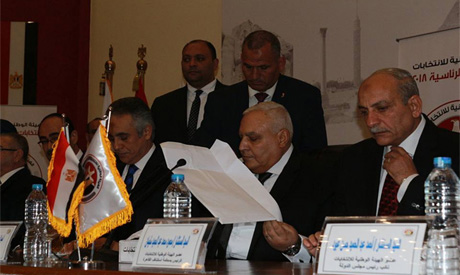
Egypt's National Elections Authority issues statements about Sami Anan and Khaled Ali (Photo: Ahram)
Egypt's National Elections Authority (NEA) issued two statements on Thursday addressing the removal of Lt. General Sami Anan from the voter registry as well as statements made by former presidential hopeful Khaled Ali criticising the NEA.
The NEA said that Anan was removed on Tuesday from the voter registry of the upcoming 2018 presidential elections because he is still a member of the Armed Forces, whose personnel are barred from political activity.
Anan’s removal from the registry came hours after the military said it was investigating him for breaching the laws of military service by running for office before ending his service and without seeking the army's permission.
The NEA said in its statement that lawyer Amr Abdel-Razek submitted to the authority documents showing that Anan was still a member of the Armed Forces, after which a committee was formed to review the documents.
"It has been proven to the committee… that Lt. General on call Sami Anan is still in the military service," said the NEA statement.
The NEA responded in a separate statement to comments made by Khaled Ali, a prominent rights lawyer and former presidential candidate, who recently withdrew his candidacy from the presidential elections, in part over what he described as “a lack of cooperation” from the NEA in providing him with the number of endorsements submitted by citizens supporting his candidacy.
The NEA said that it is up to the candidate himself or his legal representative to submit the endorsement forms to the authority.
“The NEA has an automated system that links all public notaries and real estate registration offices that are mandated with issuing forms of endorsements; this automated system only states the numerical enumeration of potential candidates who received endorsements across Egypt as well as the number of citizens who released forms of endorsement,” the NEA statement said.
Hopeful candidates must receive endorsements from a minimum of 20 MPs or 25,000 citizens from at least 15 governorates, with at least 1,000 endorsements from each governorate. The timetable set to collect endorsements has been set for 20 to 29 January.
The NEA also responded to Ali’s assertion that the nine-day period set for collecting endorsements was “unfairly short.”
The NEA said that the 2014 constitution “has already set a clear timeline for the presidential elections.”
The timetable to collect endorsements has been set from 20 to 29 January.
So far, President Abdel-Fattah El-Sisi has been the only candidate to present the necessary documents required to qualify to run. The documents were submitted to the NEA on Wednesday by El-Sisi’s campaign spokesperson and legal advisor Ahmed Bahaa Abu Shokka.
The elections will be held on 26-28 March, with a possible run-off vote scheduled for 24-26 April.
If only one nominee qualifies to run in the March elections, Article 26 of the presidential elections law stipulates that polls would still be held, with the sole candidate needing approval from 5 percent of eligible voters to become the country's president.
Short link: